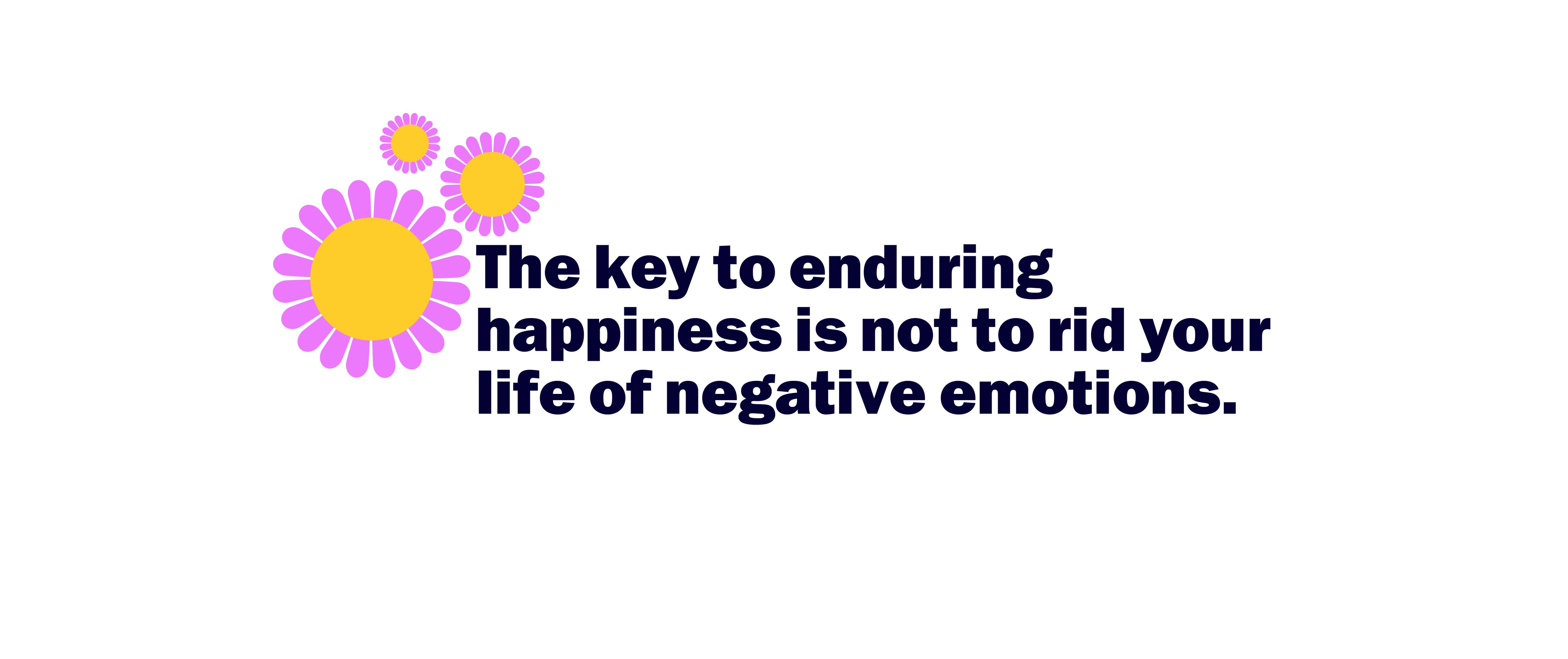Looking at the world around us, happiness may seem an unattainable goal. As we move into the fourth year of a pandemic that has killed millions and continues to threaten health and well-being worldwide, compounded by devastating consequences of climate change, spikes in hate crimes, and continued fallout from systemic oppression and inequality, there seems little reason to be happy. Indeed, results from the 2022 annual Stress in America survey indicate one-third of the respondents report that their stress in the face of these challenges is “overwhelming.”
Simply ignoring or denying stress, or suppressing your negative emotions and pretending everything is just fine, will not lead to enduring happiness. In most cases, negative emotions are, surprisingly, useful—they provide important signals about our environment and can guide us to an appropriate response. For example, fear signals that you might be in a potentially dangerous situation and you should try to get away; anger may motivate you to confront an injustice. Similarly, overly focusing on pursuing positive emotions like happiness can paradoxically result in less happiness. Really, too much of any emotion in the wrong context will not serve you well. Noticing, recognizing, and labeling your emotions—both the negative and the positive—is associated with better physical health and emotional well-being.
The key to enduring happiness is not to rid your life of negative emotions; instead, the goal is to also experience positive emotions even in the midst of difficulties. This balance can be particularly challenging when times are dark. In my research, I work with people who are experiencing significant life stress, such as diagnosis with a serious disease or caregiving for a loved one with dementia, and teach them skills to increase the positive emotions of the experience alongside the negative. These skills include noticing and savoring positive events, mindful awareness, nonjudgment, gratitude, and acts of kindness, among others. Our research has demonstrated practicing these skills leads to more happiness, even when life seems especially difficult.

One of our study participants who is caring for a family member with dementia described to me how she uses positive emotional skills she learned in our program to cope with the stress of caregiving: “There are days I just want to go and jump in my car and drive and never come back. So I think, ‘OK, I’m grateful for this. I have this, I can do this. I’m resourceful.’” In the past, she says, “I would just be so angry sometimes at my situation. Now I’m able to go, ‘OK, I can be angry for two minutes and then, Done! Not all day long.’”
Practicing these skills works for me too. During the pandemic, I have been noticing and savoring the small things more—for example, this morning, before I sat down to write, I took the time to appreciate that even though it is cold here in Chicago, the sun is out, a welcome change from the past week or so of clouds. The sun shining is not going to change any of the really big problems in the world right now, but by taking a moment to notice, I get an additional hit of positive emotion and feel better equipped to cope with whatever challenges come up in my day.
In 1867, abolitionist, feminist, and human-rights crusader Sojourner Truth captured this philosophy well: “Life is a hard battle anyway. If we laugh and sing a little as we fight the good fight of freedom, it makes it all go easier. I will not allow my life’s light to be determined by the darkness around me.” Rather than a laser focus on achieving happiness in the face of life’s big and small challenges, follow Sojourner Truth’s advice and find the small things you can do to bring more moments of happiness into each day, while still acknowledging that life can be a hard battle. Donate to an organization that feeds the hungry. Let a co-worker know that you are grateful for their help on a big project. Take a few moments to savor your delicious morning coffee or even just look at pictures of puppies and kittens on the internet. Intentionally seek out the moments of laughter and song that will allow your life’s light to shine, even when the world seems darkest. That’s the definition of happiness.
Moskowitz is a professor of medical social sciences at Northwestern University and director of research at the Northwestern Osher Center for Integrative Health
- Cybersecurity Experts Are Sounding the Alarm on DOGE
- Meet the 2025 Women of the Year
- The Harsh Truth About Disability Inclusion
- Why Do More Young Adults Have Cancer?
- Colman Domingo Leads With Radical Love
- How to Get Better at Doing Things Alone
- Michelle Zauner Stares Down the Darkness
